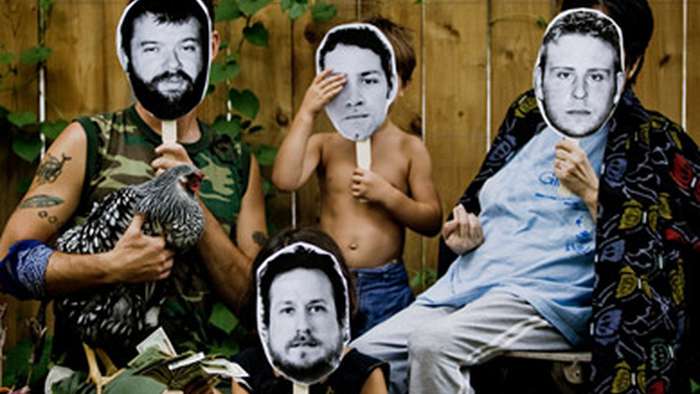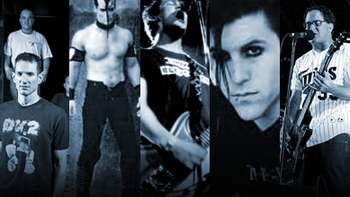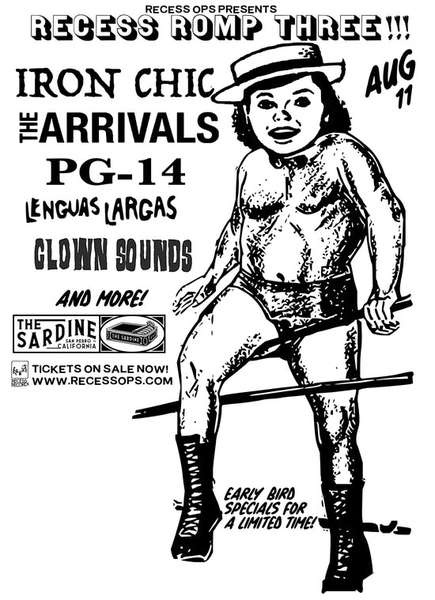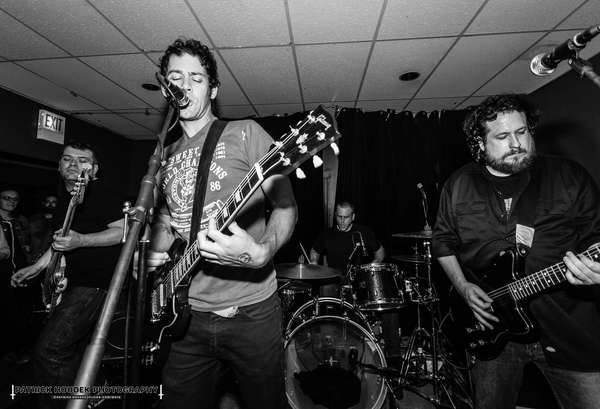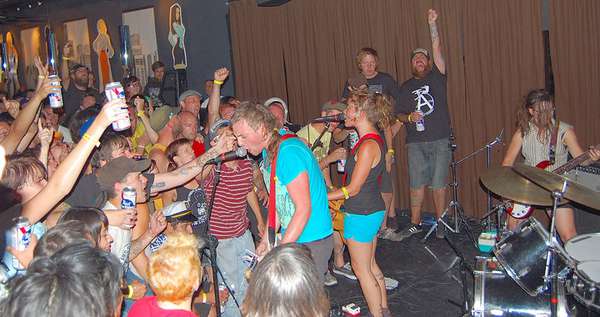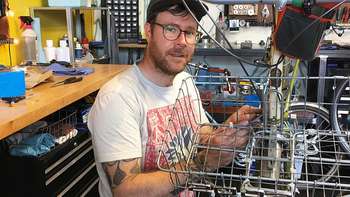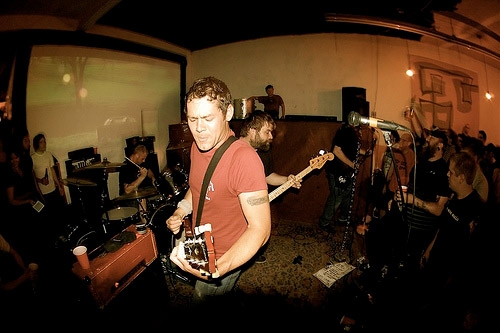
Chalk it up to poor planning on my behalf and maybe a little miscommunication somewhere along the way, but I was a block from the Turf Club when my phone range and Dave of the Arrivals told me he got my message and the interview was on. I may not have brought any notes, but at least I brought my recorder. Soon, I was sitting downstairs in the Clown Lounge with three-quarters of the band. Fake Boys had just finished, with The Gateway District up next, followed by The Arrivals, and then Off With Their Heads.
Bassist Paddy Costello was absent, but the three original band members: Little Dave (guitar/vocals), Isaac (guitar/vocals), and Ronnie (drums) were all there and ready to talk. I may have missed several questions I had prepped, but the band was more than willing to discuss how they approach writing and recording, a near arrest tour experience, and why they don’t want to bum people out with their music.
The Arrivals formed over a decade ago in Chicago. They have survived a change in bass players and several cross-country tours. Their most recent release is 2010’s Volatile Molotov on Recess Records. You can find Scene Point Blank’s review here.
Scene Point Blank: Do you want to talk about the new record? How does your writing process work. Your last couple records have been roughly 4-5 years apart. Do you work on them the whole time, or do you take a lot of downtime?
Ronnie: We all have our home lives. I think with this record we had a lot of songs that we were playing out once in a while when we did have shows and kind of breaking them in live a little bit. And then, when we started piecing songs together more and more, whenever we were getting together, it was just Isaac, Dave, and me. Instead of practicing every week like a lot of bands do. They have a practice spot they go every week. We’re kind of without a bass player most of the time. We’re down in Chicago so we just get together and, basically, Dave’s brought riffs to the table that we’ve formed as songs. Not right away, but they’re a gradual process and the same with Isaac. And then I think there’s even been a few times that I’ve came to the table with a few things and then these guys will take it and kind of mold it into what they wanted. But I would say that between all three of us and even Paddy now, I think the reason why we’ve had a long time in between records is just because instead of pushing for something and doing it just to do it, it kind of feels better when it just happens. It feels right. In case there was any question about why it’s taken, well, we put out a record and then five years later we put out another but I think it’s important to just let things happen like that and it’ll just feel better than trying to push for something.
And just crazy, hectic life at home it’s like, you know, everybody could relate.
Isaac: It seems like it always happens—or it seems like it’s always happened in the past—where we get done with a record and we’re kind of in that mode, so like two or three songs fall out the next month after we finish. There were two or three of them that came out basically as soon as Marvels of Industry was done and then, I’d say like half the record, like Ronnie said, we just put it together kind of slowly over the next couple years. Then, maybe a year before Volatile Molotov, we put that record together it was like “we should really do another record” and then there was like and then six months went by and we didn’t do anything and then there was six months of push like, “alright, I remember talking to Dave about it on the phone, like ‘dude we’ve got to sit down and write some songs.’” So, yeah, it happens all different ways. I know for a fact that, I can speak for myself but I think for you too, Dave, that like there were two or three songs where it was really like, “Fuck, I need to write a couple songs for this record.” Laughs. “The Dilemma” is one of them and “Simple Pleasures in America” those were two that –
Dave: Those were written a couple days before the studio.
Isaac: We didn’t even demo them I don’t think it was like we put them together. Or, no, we did.
Dave: You put them together on Garageband.
Isaac: And then we demoed them again and anyway, so it just happened. We do it any way we can get them. Laughs. We put out that Razorcake 7”. To my mind those three songs on there probably would have been album songs. I’m glad they weren’t. But, like, we didn’t chince at all for that 7”. I think we went all out and put really good songs on that 7” and so, yeah, anyway. There’s no process at all, actually. Laughs.
Ronnie: I was going to say that what’s cool is that, after this record, it’s like we also we had about 15-20 minutes worth of music that could have gone on the record that just didn’t quite fit a lot of the other songs.
Isaac: More than that.
Ronnie: We just have a bunch of songs now that we didn’t put on the record but it’s like, okay, now we have these songs we have the option like of doing what we want with them. Do we want to go and put these songs on another record.
Isaac: Truthfully, we had a lot of heavier, darker songs. Man, if we put out this record, it’s going to bum people out.
Scene Point Blank: I thought this was one of your happier-sounding ones.
Isaac: Yeah, we wanted to make a positive record so we dumped probably a half-hour’s worth of music. I forgot, that was the six months between when Dave said, “Let’s write a record” and then we started—
Dave: We were writing some angry stuff and then a nine minute blast-epic about war. Look out for the single-sided 10” coming out soon.
Scene Point Blank: So why did you want to write happier songs?
Dave: I don’t think there’s many happy songs on the record. Laughs. I think we’ll all, generally, more happy, optimistic kinds of people and I know that for me, when I write songs, I tend to write songs about things that upset me or something. I don’t know if it’s just because I listen to a lot of music…that’s punk rock.
Scene Point Blank: There are very few positive punk songs.
Dave: Yeah, exactly…I totally lost my train of thought.
Ronnie: Well, we were talking about how there’s hardly any positive songs in punk rock but, quite honestly, like, I think, ever since we’ve been a band, I just think it’s great that we’ve all been friends since high school and it’s like we’ve been in a band pretty much since we’ve been in high school and I just think it’s a great release. I think like it’s a fun, great thing. I cut you off for no reason. I had nothing important to say.
Dave: I think a lot of the upbeat nature of the music, too, is like where we come from. I like pop songs with clever, memorable hooks and things like that. So even if the lyrical subject matter is on the negative side, the songs I like to listen to the most are melodic and happy-sounding songs, and oftentimes they have contrasting, dark lyrics. So, I’m just being a rip-off artist whenever I’m writing a pop song about sad stuff. Laughs.
